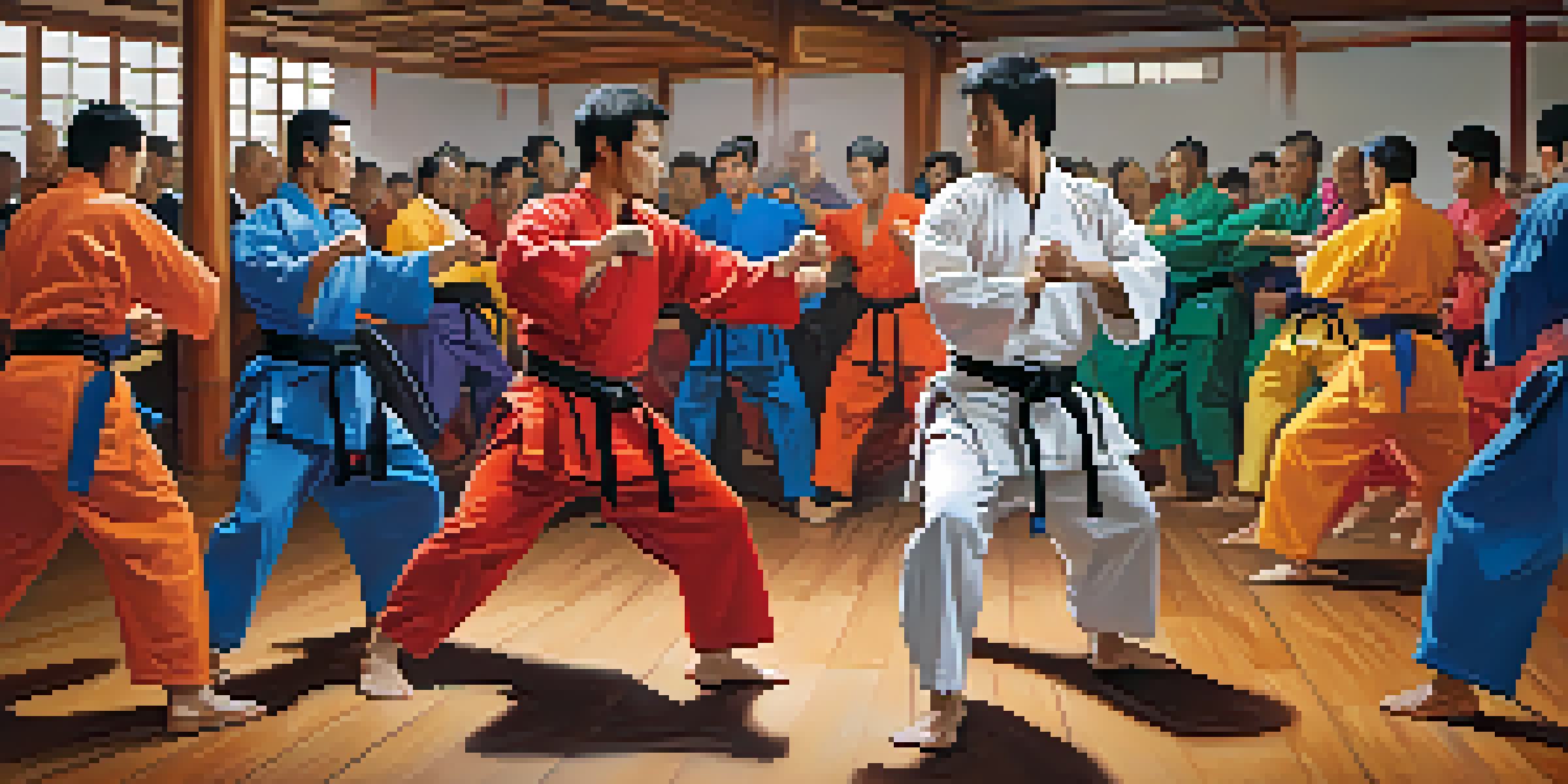Martial Arts as a Path to Mindfulness and Personal Growth

Understanding Martial Arts and Its Essence
Martial arts encompass a variety of combat practices and traditions, each with its own unique philosophies and techniques. At its core, martial arts is not just about physical strength; it emphasizes discipline, respect, and self-awareness. Many practitioners find that engaging in martial arts leads to a deeper understanding of themselves, both mentally and emotionally.
The greatest victory is that which requires no battle.
Imagine martial arts as a dance where each movement requires focus and intention. This focus allows individuals to connect with their bodies and minds, creating a harmonious balance. As practitioners learn to control their movements, they also learn to control their thoughts and emotions, paving the way for personal growth.
Ultimately, martial arts serves as a mirror, reflecting our strengths and weaknesses. This self-reflection is crucial for mindfulness, as it encourages practitioners to examine their actions and reactions in a safe environment.
The Role of Mindfulness in Martial Arts Training
Mindfulness is the practice of being present and fully engaged in the moment, free from distraction or judgment. In martial arts, mindfulness is cultivated through techniques such as controlled breathing, meditation, and focused movements. Each training session becomes an opportunity to practice mindfulness, allowing individuals to clear their minds and concentrate on their techniques.

For instance, when executing a kick, a martial artist must be aware of their body position, breathing, and the energy they project. This heightened awareness not only improves performance but also promotes a sense of calm and clarity. Over time, these moments of mindfulness can spill over into daily life, helping practitioners manage stress and anxiety more effectively.
Martial Arts Cultivates Self-Discipline
Regular practice in martial arts instills dedication and perseverance, shaping character and promoting personal growth.
Moreover, the repetitive nature of martial arts training fosters a meditative state. As practitioners repeat movements, they enter a flow state, where the outside world fades away, and they become completely absorbed in the task at hand.
Building Discipline Through Martial Arts Practice
Discipline is a cornerstone of martial arts training, teaching individuals the importance of dedication and perseverance. Regular practice requires commitment, which in turn fosters self-discipline that can be applied in all areas of life. This consistent effort helps shape character and instills values such as respect and responsibility.
Martial arts are ultimately self-improvement.
Consider the process of earning a new belt in martial arts. Each level requires hours of practice, understanding techniques, and passing tests. This journey teaches students that progress takes time and effort, reinforcing the idea that personal growth is a gradual process.
As martial artists learn to push through challenges, they develop resilience. This resilience not only aids in martial arts but also equips them to handle life's obstacles with grace and determination.
Enhancing Focus and Concentration Skills
In our fast-paced world full of distractions, the ability to focus is invaluable. Martial arts training sharpens concentration through various drills and sparring sessions, where practitioners must stay alert and responsive. This enhanced focus helps individuals tune out distractions and hone in on their goals.
For example, during sparring, a martial artist must analyze their opponent's movements while simultaneously planning their own strategy. This mental engagement develops quick thinking and sharpens observational skills, which are beneficial both in and out of the dojo.
Mindfulness Enhances Performance
Practicing mindfulness through martial arts improves focus and emotional regulation, benefiting both training and daily life.
As students practice maintaining focus, they often find that their concentration improves in other areas of life, such as work or study. The skills learned in martial arts can translate into better productivity and performance in daily tasks.
Fostering Emotional Awareness and Regulation
Martial arts training encourages emotional awareness by helping practitioners recognize and understand their feelings. As individuals engage in physical activities, they often encounter moments of frustration, fear, or exhilaration. Acknowledging these emotions is a critical step towards emotional regulation and personal growth.
In a sparring match, for instance, a martial artist may feel anxiety before facing a more experienced opponent. This feeling becomes an opportunity to practice mindfulness—acknowledging the emotion without letting it dictate their performance. Over time, individuals learn to manage their emotions more effectively.
This emotional intelligence gained through martial arts can improve relationships and communication skills. Practitioners often find that they can approach difficult conversations with a calm demeanor and a clearer perspective, leading to healthier interactions.
Community and Support in Martial Arts
One of the most valuable aspects of martial arts is the sense of community it fosters. Practitioners often train together, forming bonds that extend beyond the dojo. This support system encourages personal growth, as individuals share experiences, challenges, and triumphs.
Imagine a group of students preparing for a tournament, all cheering each other on and offering constructive feedback. This camaraderie creates a nurturing environment where everyone feels valued and motivated to improve. The relationships built in martial arts often lead to lifelong friendships.
Community Supports Personal Growth
The sense of community in martial arts fosters accountability and motivation, leading to lasting friendships and shared experiences.
Furthermore, being part of a community encourages accountability. Knowing that others are invested in your journey can inspire you to push through difficulties and strive for your personal best.
Applying Martial Arts Principles to Daily Life
The lessons learned in martial arts are not confined to the dojo; they can profoundly impact daily life. By embracing principles such as respect, discipline, and mindfulness, practitioners can navigate challenges with a fresh perspective. The skills developed during training become valuable tools for personal and professional growth.
For example, the focus and discipline cultivated in martial arts can enhance time management skills. Practitioners often find themselves more organized and efficient in tackling tasks, whether at work or home. This newfound approach can lead to increased productivity and satisfaction.

Moreover, the resilience built through martial arts training empowers individuals to face life's uncertainties with courage. Instead of shying away from challenges, they learn to approach them head-on, viewing obstacles as opportunities for growth.